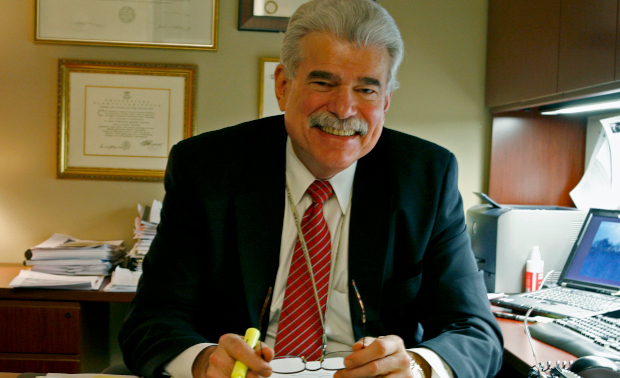For years, the media turned to our deputy chief medical officer for counsel on cancer issues
J. Leonard Lichtenfeld, MD, better known as Dr. Len, leaves the Society on Sept. 1 after two decades of explaining cancer issues in easily understood terms to readers of his blog, members of the media, congressional committees, and ACS staff and volunteers.

Most recently, he was the face of ACS during the COVID-19 pandemic. He and former ACS staffer David Sampson, strategic director, Medical & Science Communications, with whom he worked very closely, did podcasts, tweets, and numerous media interviews about the pandemic and its effect on cancer detection and treatment, and Dr. Len helped guide the decisions about event cancellations, and the closing of ACS offices, Hope Lodge facilities, and Discovery Shops.
His guidance was always helpful, informative, and often comforting, perhaps because of his warm personality and folksy nature.
“It has been an incredible journey and I mean that from the heart,” Dr. Len said. “I came to the Society as a medical editor in 2001, and in 2002 assumed responsibility for managing the newly created Cancer Control Science Department. Because I had a wide variety of experience – 19 years of practicing medicine, expertise in policy, legislative, and regulatory issues related to health care, as well as a lot of experience talking to the media – they created the job of deputy chief medical officer for me. I got to use all my skills. There are not many opportunities around that allow someone to do what I have been able to do. It was wonderful, and I will be forever grateful.”
Dr. Len also served as interim chief medical officer from November 2018 to October 2019, taking over when Otis Brawley, MD, resigned to become the Bloomberg Distinguished Professor of Oncology and Epidemiology at Johns Hopkins University.
Dr. Len looks back with pride on his role in providing the public with cancer information based on evidence. “We were able to create policy and guidance and provide people with as unbiased information as we could. It made me so proud of the Society, and being honest and effective enhanced the American Cancer Society’s reputation,” he said.
Dr. Len was sensitive to not wanting to overpromise and tout promising therapies before they were scientifically proven. As a result, Dr. Len’s Blog, which he started writing in 2005, often provided the voice of scientific reason when it came to assessing the latest “cancer cure.” The head of a major cancer organization recently told Dr. Len that she has saved several of his blog posts and reads them regularly to keep her focused on her mission. Journalists, too, expressed appreciation for the information the blog provided.
During his time at the Society, Dr. Len has seen huge strides made in the treatment of cancer, as well as falling mortality rates. He cited two “game changers” - Gleevec and Herceptin - two drugs made possible, in part, by ACS-funded research.
He remembers well the first reports of Imatinib (Gleevec) being used successfully to treat chronic myeloid leukemia (CML). “I had experience with that disease as a practitioner. Back then it was almost universally fatal. I had a young man whose CML became acute, and he committed suicide because he knew what the outcome would be. That was a devastating phone call,” he said. Today, thanks to tyrosine kinase inhibitors, of which Gleevec is just one, the current 5-year relative survival rate for adults is 69% for CML, up from 22% in the mid-70s.
Dr. Len said he also remembers being at an ASCO (American Society of Clinical Oncology) meeting when thousands of oncologists stood up and cheered upon hearing reports of Herceptin's success treating HER2-positive breast cancer.
Immunotherapies and targeted drugs also are saving lives from lung cancer and melanoma. “The decline in melanoma deaths year over year has been incredible,” he said, “and reports are coming out right now saying we are making incredible gains in reducing mortality in lung cancer.” This 2019 blog talks about more and more people surviving melanoma, once a sure killer, and this blog talked about how we could achieve similar success with lung cancer.
“I am still very concerned about overpromising and under delivering, but I come to this point in my career more optimistic than ever about cancer treatments,” he said, although he was quick to note that COVID-19 “could put a significant dent in our progress.” He said “the research enterprise has been disrupted, some clinical trials have been halted, people are afraid to get screened. We will pay a societal price for what we have seen happening as a result of COVID.”
Dr. Len wants his colleagues to know that “this is an incredible organization that does incredible things every day – affecting policy in Washington, creating guidelines, and helping cancer patients and their families. There are so many terrific people in this organization who are so committed. No question, what has kept me here is the recognition of all the efforts and commitment that so many people have to this organization: Staff, volunteers, and donors. To be part of that as a team member was incredibly special on a personal level.”
He added: “We are going through difficult times and difficult times require difficult decisions, not only here, but throughout the world. My departure is a consequence of that. Having said that, I am grateful for the experience I have had, and the people I have worked with and had the opportunity to touch. I am moving forward with optimism and we’ll see what the future holds.”
Good luck, Dr. Len, with the new endeavors you choose to pursue.
*Shared from MySocietySource.
No comments:
Post a Comment